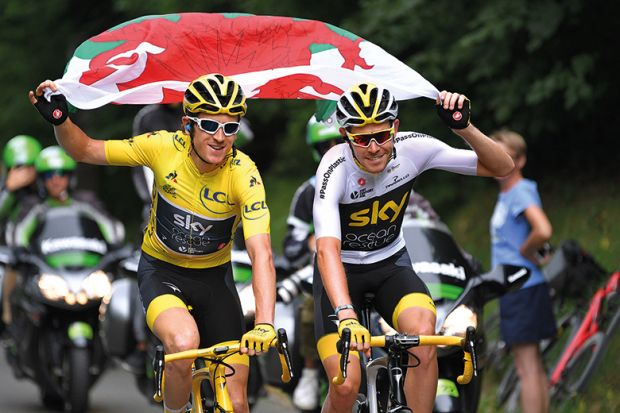That there is more than one way for a leader to scale the mountain pass is most clearly demonstrated in sport.
It’s tempting at this point to talk about Gareth Southgate, the England football manager who won plaudits during the World Cup for being modest and rational (this is not normal) while getting an unfancied side to the semi-finals.
But football is so last month, so let’s instead take cycling, which has just completed its biggest competitive event of the year: the Tour de France.
The top team, Sky, is led by the domineering figure of Dave Brailsford, a details-obsessed winner who has overseen six Tour victories since 2012, at the same time as dealing with media feuds and anti-doping investigations that would have sent a weaker character over the handlebars.
The other, newly crowned, leader in Team Sky is the cyclist Geraint Thomas, winner of this 2018 Tour at the age of 32. Thomas was not, until this year, the main man – much of his career has been in supporting roles, stewarding the likes of Chris Froome to the podium on the Champs-Élysées.
After his victory, the former Great Britain cyclist Michael Hutchinson recounted a story about Thomas. “On the day Froome crashed out of the tour in 2014, dozens of journalists hung around the hotel all evening. Eventually the team arrived, and Geraint Thomas acted as team spokesman,” Hutchinson recalled.
“After he’d explained how Froome was, he took a few questions. And when he finished, a TV interviewer said: ‘Just for the record, who are you?’ ‘Geraint Thomas,’ he said. The interviewer said: ‘And what do you do? Are you a mechanic or something?’ He explained that he was a rider, with a degree of patience that was astonishing. If it had been [the sprint specialist] Mark Cavendish, someone would have got eaten.”
This wonderful anecdote underpins descriptions of Thomas as a modest, unassuming team player – but also plainly a leader, both on and off the road.
Writing in last week’s Times Higher Education, Mike Thomas, vice-chancellor of the University of Central Lancashire (and no relation to Geraint, as far as I am aware), argued that this is a model of leadership that we need more of in academia.
It is a mistake, he argued, to import the “heroic leadership” model from the corporate world.
The idea that a university needs a “domineering talisman…to galvanise workers to generate commercial success” fundamentally misunderstands the institution’s nature, he said, making the case instead for a “stewardship model” in which the president or vice-chancellor is the “keeper of the flame”.
A similar argument was made by Glyn Davis, one of Australia’s pre-eminent vice-chancellors (soon to step down from the helm of Melbourne University), who recently argued that vice-chancellors do not, in fact, have any individual authority. That, he said, makes leadership in academia a subtler, more rewarding challenge than the equivalent role in a purely commercial environment.
“In an institution where no one actually has to do what you tell them, you have to persuade, hold the line, develop the strategy and carry it through. It’s a magnificent opportunity to test your skills,” Davis said.
At a time when universities need leadership that can be persuasive and robust enough to deal with internal strategic challenges as well as with policymakers and the public, we devote our cover story to six academic administrators: some who have run institutions, others who have led parts of their university, some still in post, others writing with the benefit of distance.
All offer insights that bring the difficulties, pressures and occasional triumphs of university leadership to life. They are also a reminder that those in charge aren’t omniscient, rely heavily on support teams, and aren’t, typically, the ogres they are sometimes made out to be.
As in cycling, where riders form a peloton and work for each other, universities are both fiercely competitive and deeply collaborative places. It’s a contradiction that makes academia what it is.
As for leadership, it’s pleasing that it is at least possible for the team player to come out on top.
POSTSCRIPT:
Print headline: Leaders with the pack
Register to continue
Why register?
- Registration is free and only takes a moment
- Once registered, you can read 3 articles a month
- Sign up for our newsletter
Subscribe
Or subscribe for unlimited access to:
- Unlimited access to news, views, insights & reviews
- Digital editions
- Digital access to THE’s university and college rankings analysis
Already registered or a current subscriber? Login



